【2022中考英语一轮教材专题复习】外研八年级上册 Modules 10-12课件(共105张PPT)
文档属性
| 名称 | 【2022中考英语一轮教材专题复习】外研八年级上册 Modules 10-12课件(共105张PPT) |

|
|
| 格式 | pptx | ||
| 文件大小 | 3.6MB | ||
| 资源类型 | 试卷 | ||
| 版本资源 | 外研版 | ||
| 科目 | 英语 | ||
| 更新时间 | 2022-02-11 00:00:00 | ||
图片预览

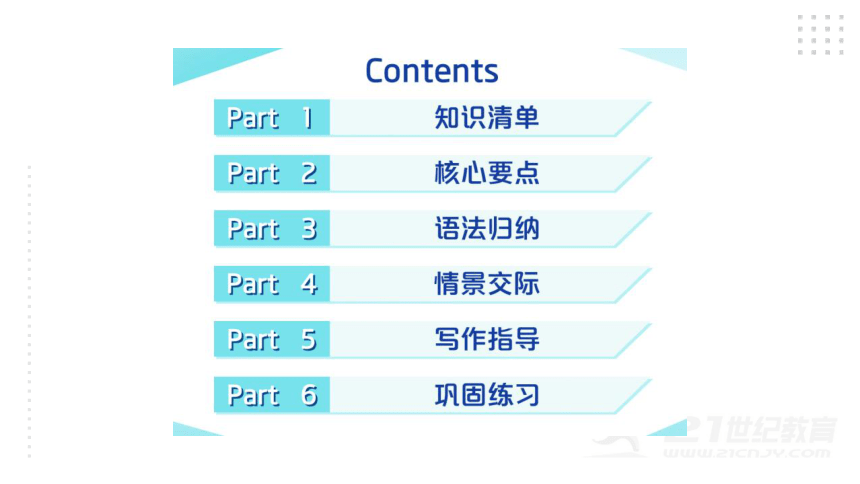
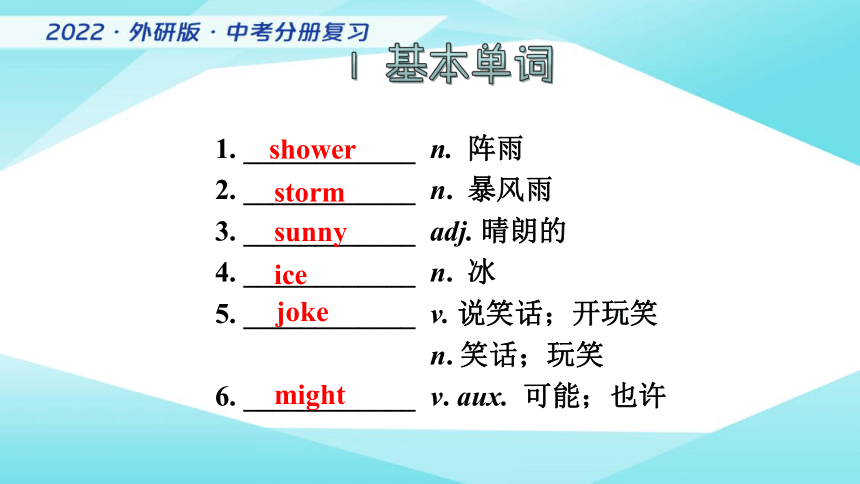
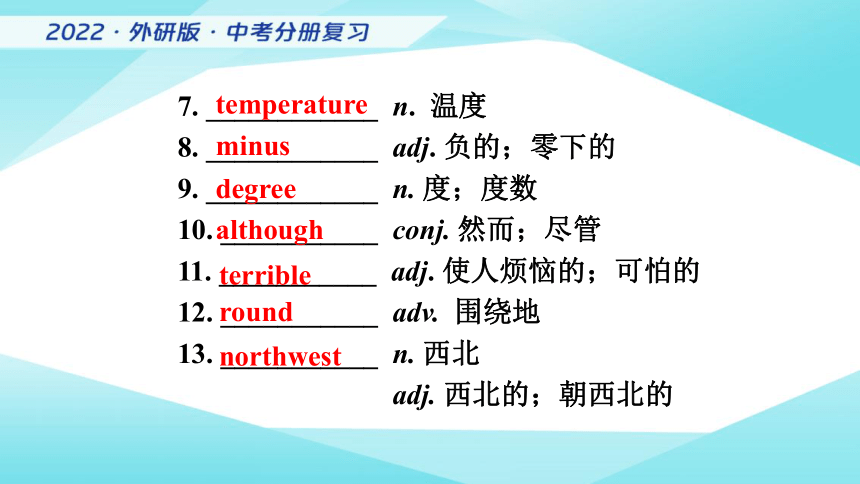
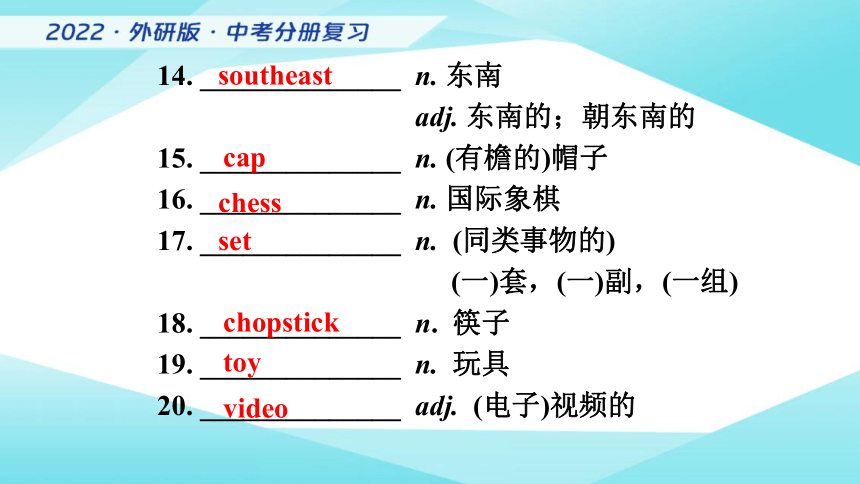
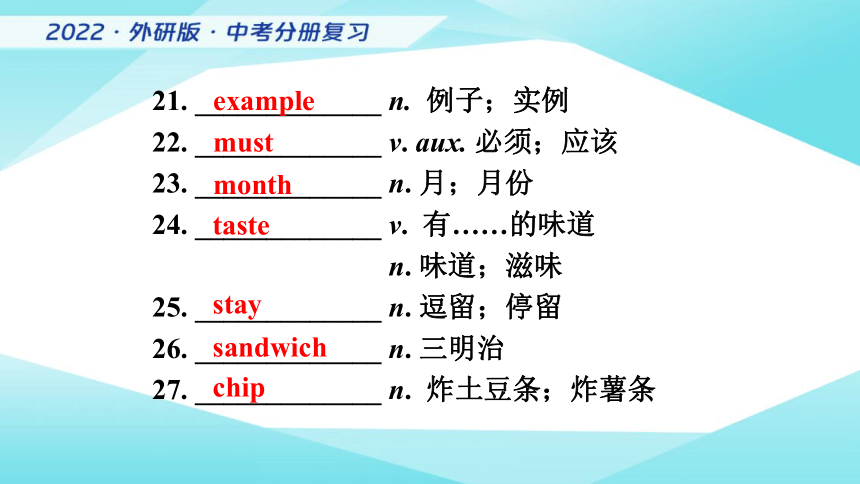
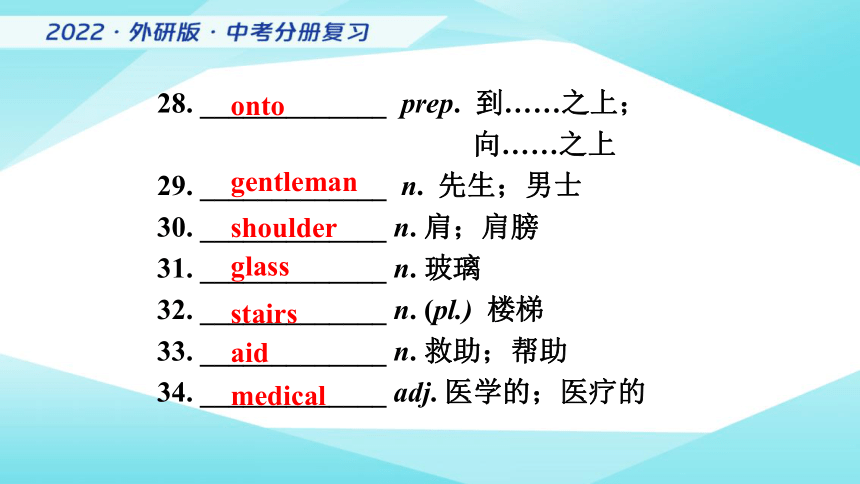
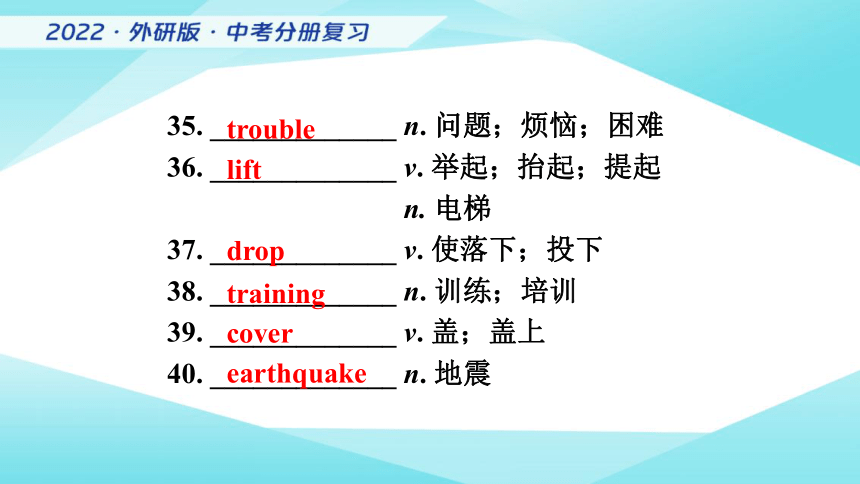
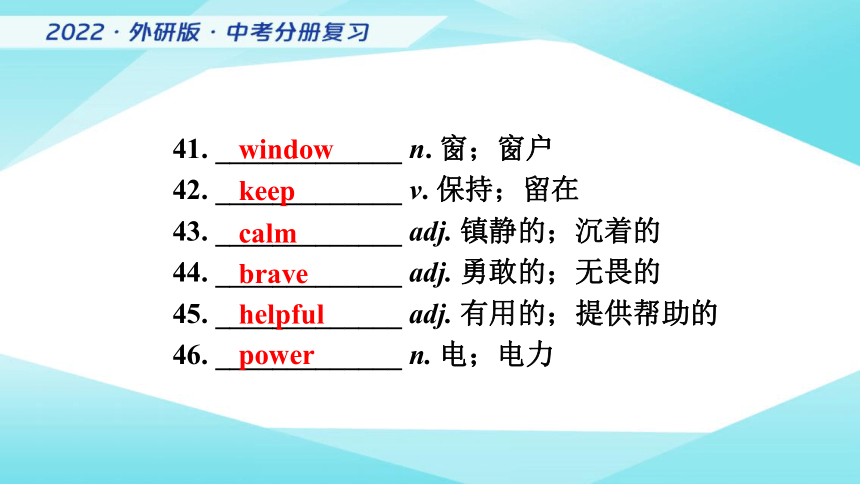
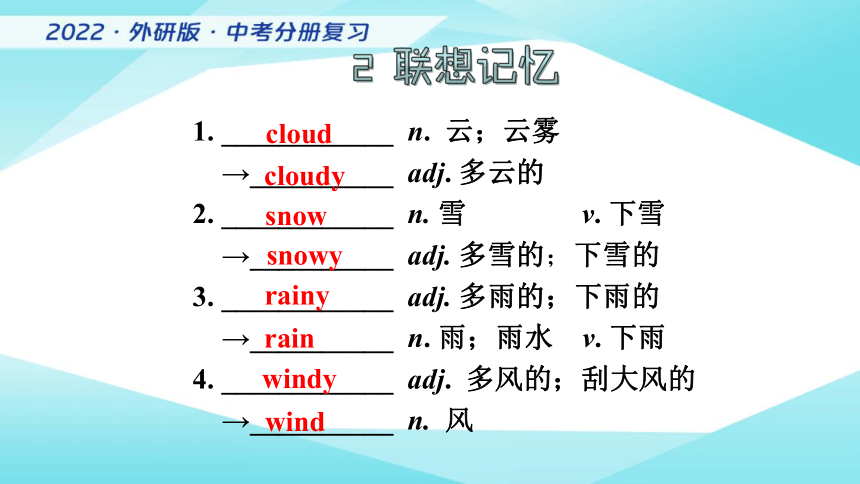
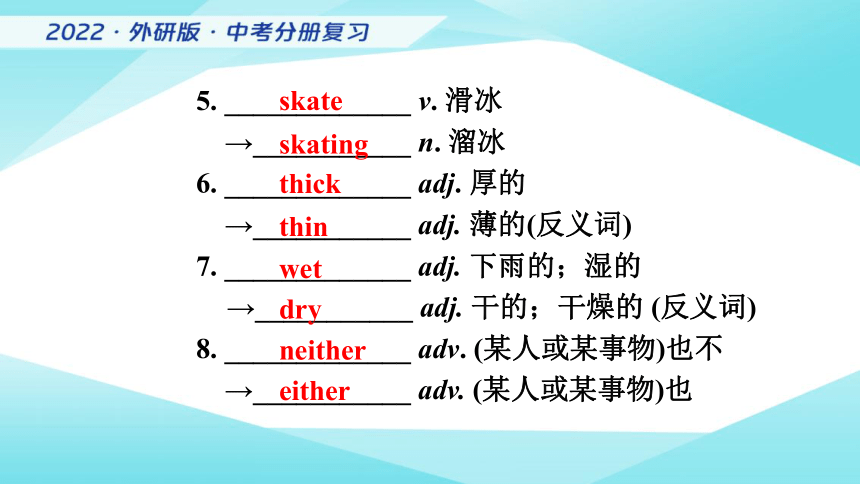
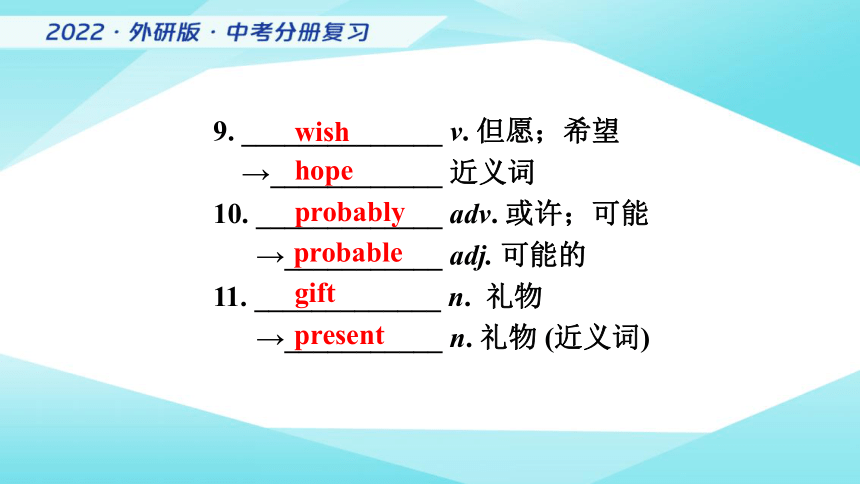
文档简介
(共105张PPT)
外研版八年级上册
Modules 10-12
Presentation
1. ____________ n. 阵雨
2. ____________ n. 暴风雨
3. ____________ adj. 晴朗的
4. ____________ n. 冰
5. ____________ v. 说笑话;开玩笑
n. 笑话;玩笑
6. ____________ v. aux. 可能;也许
shower
storm
sunny
ice
joke
might
7. ____________ n. 温度
8. ____________ adj. 负的;零下的
9. ____________ n. 度;度数
10. ___________ conj. 然而;尽管
11. ___________ adj. 使人烦恼的;可怕的
12. ___________ adv. 围绕地
13. ___________ n. 西北
adj. 西北的;朝西北的
temperature
minus
degree
although
terrible
round
northwest
14. ______________ n. 东南
adj. 东南的;朝东南的
15. ______________ n. (有檐的)帽子
16. ______________ n. 国际象棋
17. ______________ n. (同类事物的)
(一)套,(一)副,(一组)
18. ______________ n. 筷子
19. ______________ n. 玩具
20. ______________ adj. (电子)视频的
southeast
cap
chess
set
chopstick
toy
video
21. _____________ n. 例子;实例
22. _____________ v. aux. 必须;应该
23. _____________ n. 月;月份
24. _____________ v. 有……的味道
n. 味道;滋味
25. _____________ n. 逗留;停留
26. _____________ n. 三明治
27. _____________ n. 炸土豆条;炸薯条
must
month
example
stay
taste
sandwich
chip
28. _____________ prep. 到……之上;
向……之上
29. _____________ n. 先生;男士
30. _____________ n. 肩;肩膀
31. _____________ n. 玻璃
32. _____________ n. (pl.) 楼梯
33. _____________ n. 救助;帮助
34. _____________ adj. 医学的;医疗的
onto
gentleman
shoulder
glass
stairs
aid
medical
35. _____________ n. 问题;烦恼;困难
36. _____________ v. 举起;抬起;提起
n. 电梯
37. _____________ v. 使落下;投下
38. _____________ n. 训练;培训
39. _____________ v. 盖;盖上
40. _____________ n. 地震
trouble
lift
drop
training
cover
earthquake
41. _____________ n. 窗;窗户
42. _____________ v. 保持;留在
43. _____________ adj. 镇静的;沉着的
44. _____________ adj. 勇敢的;无畏的
45. _____________ adj. 有用的;提供帮助的
46. _____________ n. 电;电力
window
keep
calm
brave
helpful
power
1. ____________ n. 云;云雾
→__________ adj. 多云的
2. ____________ n. 雪 v. 下雪
→__________ adj. 多雪的;下雪的
3. ____________ adj. 多雨的;下雨的
→__________ n. 雨;雨水 v. 下雨
4. ____________ adj. 多风的;刮大风的
→__________ n. 风
cloud
cloudy
snow
snowy
rainy
rain
windy
wind
5. _____________ v. 滑冰
→___________ n. 溜冰
6. _____________ adj. 厚的
→___________ adj. 薄的(反义词)
7. _____________ adj. 下雨的;湿的
→___________ adj. 干的;干燥的 (反义词)
8. _____________ adv. (某人或某事物)也不
→___________ adv. (某人或某事物)也
skate
skating
thick
thin
wet
dry
neither
either
9. ______________ v. 但愿;希望
→____________ 近义词
10. _____________ adv. 或许;可能
→___________ adj. 可能的
11. _____________ n. 礼物
→___________ n. 礼物 (近义词)
probably
probable
wish
hope
gift
present
12. _____________ n. 惊奇;意外之事
v. 使(某人)吃惊
→___________ adj. 惊奇的;惊讶的
→___________ adj. 令人惊讶的,
出人意料的
13. _____________ adv. 立刻;当即
→___________ adj. 立刻
surprise
surprised
surprising
immediately
immediate
14. _____________ n. 差别;差异
→___________ adj. 不同的;差异的
15. _____________ v. 收受;接受
→___________ v. 接收 (近义词)
16. _____________ n. 传统习俗
→___________ adj. 传统的
17. _____________ adj. 认真严肃的;
不开玩笑的
→ __________ adv. 严肃地;认真地
difference
accept
traditional
receive
tradition
different
serious
seriously
18. _____________ n. 经历;经验
→___________ adj. 有经验的
19. _____________ pron. 某人;有人
→___________ pron. 任何人
20. _____________ adj. 破碎的
→___________ v. 打碎;折断
21. _____________ v. 想象,设想
→___________ n. 想象
experienced
experience
someone
anyone
broken
break
imagine
imagination
22. _____________ n. 底部;下端
→___________ n. 顶部;顶端
23. _____________ adj. 有毛病的;错误的
adv. 不正确地;错误地
→___________ adj. 正确的 adv. 正确地
24. _____________ adj. 有害的
→___________ n. 危害;伤害
bottom
top
wrong
right
harmful
harm
25. _____________ v. 警告;告诫
→___________ n. 警告
26. _____________ n. 内部;里面
adv. 在里面;向室内
prep. 在……里面
adj. 里面的;内部的
→___________ 反义词
27. _____________ prep. 在……正下方;
在……下面
→___________ 反义词
inside
warn
warning
outside
under
over
28. _____________ adj. 不和……接触的;
不挨……太近的
v. 清除;清理;移走
→ __________ adv. 清楚地
clear
clearly
1. _____________________ 一副国际象棋
2. _____________________ 全年;一年到头
3. _____________________ 也
4. _____________________ 在……的底部
5. _____________________有兴趣做某事
6. _____________________ 快点
7. _____________________与……相比
8. _____________________ 用……盖住……
9. _____________________ 打扫卫生
a chess set
all year round
as well
at the bottom of
be interested to do sth.
come on
compared to ...
cover ... with ...
do some cleaning
10. _______________________ 急救
11. _______________________ 例如
12. _______________________ 首次;初次
13. _______________________ 有时;间或
14. _______________________ 最好
15. _______________________ 理发
16. _______________________ 做某事有困难
17. _______________________ 帮助做某事
18. _______________________ 总之;简言之
first aid
for example
for the first time
from time to time
had better
have one’s hair cut
have trouble doing sth.
help do sth.
in short
19. __________________ 不和……接触
20. __________________ 抬起;提起
21. __________________ 确保;确认
22. __________________ 注意到某人做某事
23. ____________________________
推搡着上公交车
24. __________________ 非常多
25. __________________ 从……逃出
26. __________________ 远离
keep clear of ...
lift up
make sure
notice sb. do sth.
push one’s way onto the bus
quite a lot
run away from ...
stay away from
27. _______________________ 从……跳出
28. ______________________ 带走;拿走
29. ______________________ 英式生活
30. ______________________ 拍某人的肩膀
31. ______________________ 电子游戏
32. ______________________
提醒 / 警告某人注意某事
jump out of ...
take away
the English way of life
touch sb. on the shoulder
video game
warn sb. about sth.
1. Are you coming with us
2. Are you joking
3. Sounds great!
4. Come on, better get going!
5. When is the best time to visit the US
6. What a surprise!
7. We’re happy you like it.
8. It’s bad luck!
9. You can’t be serious!
10. Afternoon tea is not just a drink but a light meal at around 4 pm.
11. What can we do to help him
12. First of all, find out what’s wrong with him.
13. How do we do that
14. How can we do that
15. That's such good advice that you could be a doctor.
16. Do not stand near street lights or under power lines.
1. snow n. 雪 (不可数) v. 下雪
【链接】
snowy adj. 下雪的
类似的词还有:
windy (多风的) cloudy (多云的)
rainy (下雨的) sunny (晴朗的)
与天气有关的英文表达:
breeze 微风 overcast 阴天的
drizzle 毛毛雨 shower 阵雨
sleet 冻雨;雨夹雪 hail 冰雹
lightning 闪电 thunder 雷声
blizzard 暴风雪 minus 零下的
chilly 寒冷的 freezing cold 非常冷
sunburn 晒伤 boiling hot 非常热
UV (ultraviolet) rays 紫外线
2. temperature n. 温度
表示温度的“高/低”用high / low
【归纳】
What’s the temperature 温度是多少?
take one’s temperature 测量体温
have a temperature 发烧
at a temperature of ... 在……度
at room temperature 在室温下
at low temperatures 在低温下
3. neither adv. (某人或某事物)也不 表示否定
neither adj. “两者都不”,修饰可数名词单数形式,其后谓语动词用单数形式。
neither pron. “两者都不”,常与介词of 连用,后跟可数名词复数形式或代词宾格;neither of...作主语时,谓语动词既可用单数也可用复数形式。
neither adv. “也不”。常用倒装结构:
“neither+系动词 / 助动词 / 情态动词+主语”
neither ... nor ... “既不……也不……”,用于连接两个并列成分,当连接两个并列主语时,谓语动词通常要与nor 后面的代词或名词在人称和数上保持一致,即就近原则。
both, all, neither, none & either
代词 用法 谓语形式
both 都 (=2),表肯定含义 复数
all 都 (≥3),表肯定含义 复数
neither 都不 (=2),表否定含义 单数
none 都不 (≥3),表否定含义 由指代的名词决定
either 两者中任意一个, 表肯定含义 单数
【语境应用】完成句子。
1) 他们俩都不喜欢老虎。
________ _______ ________ _________ tigers.
2) 两个女孩都不矮。
________ ________ ________ short.
3) 我不做运动,我妹妹也不。
I don’t play sports and ________ ________ my sister.
4) 我和刘辉都不擅长唱歌。
________ Liu Hui ______ I ______ good at singing.
Neither of them like / likes
Neither girl is
neither does
Neither nor am
1) — Where did you buy that beautiful hat, from a shop or
a supermarket
— _______. I am used to shopping online.
A. Neither B. Either C. Both D. None
2) —It’s said that Tina will go to Canada by herself.
—Yes. ______ of her parents will go with her.
A. Both B. Neither C. Either
A
B
单项选择。
4. wish v. 但愿;希望
wish短语
wish sb. sth. 希望某人…… 表示祝愿
wish + that从句 希望……
表示不可能实现或实现可能性较小的愿望。
从句的谓语动词常用虚拟语气。
wish sb. to do sth. 希望某人做某事
wish to do sth. 希望做某事
expect, wish, hope & look forward to
语块 含义及用法
expect 预料,期待,认为某事会发生。
① expect (sb.) to do sth. 期望(某人)做某事
② expect + that从句 期望……
③ be expected to do sth. 应该/被期望做某事
语块 含义及用法
wish 希望。后接从句时,从句常用虚拟语气,侧重于不太可能实现的愿望。
① wish sb. sth. 祝愿某人……
② wish (sb.) to do sth. 希望(某人)做某事
③ wish + that从句 希望……
语块 含义及用法
hope 希望,更多地表达一种情感。
① hope to do sth. 希望做某事
② hope + that从句 希望……
③ I hope so. 希望如此。
look forward to 盼望,期待
look forward to (doing) sth. 期待(做)某事
【语境应用】用hope, wish, expect, look forward to的适当形式填空。
1) I’m ___________________ hearing from you soon.
2) I _______ you can get a good job.
3) Mike didn’t pass the exam. He ______ he had worked hard.
4) _______ you a happy birthday!
5) John __________ to visit Xi’an in May.
looking forward to
hope
wished
Wish
expected
5. probably adv. 或许;可能
probably & possibly
probably 语义较强,可能性较大。在否定句中,probably不能紧跟在否定词之后。
possibly “可能地;也许”,所指的可能性较小。常与can或could等连用。
【语境应用】英译汉。
1) Mike probably told his mother all about it. He usually tells her everything.
__________________________________________________
2) I’ll do all I possibly can.
__________________________________________________
Mike很可能把这一切都告诉了他妈妈,他和她无话不说。
我将尽我的所能去做。
6. surprise n. 惊奇;惊讶
v. 使吃惊
it surprises sb. to see/find/know etc.
v.
n.
to one’s surprise
令某人感到惊奇的是
get a surprise 吃惊
in surprise 惊讶地
surprise
surprise
的派生词
surprising adj. 令人吃惊的
一般修饰事物
surprised adj.
感到惊讶的
一般修饰人
be surprised at
be surprised to do sth.
be surprised+that从句
【语境应用】根据句意选用surprise, surprised或surprising填空。
1) The bad news didn’t _________ him.
2) To my ________, they gave me the work.
3) We were __________ to know that she was English.
4) It’s __________ that our team lost the basketball game.
5) We were _________ at the _________ news.
surprise
surprise
surprised
surprising
surprised
surprising
7. accept v. 接受
单词 含义 不同
receive 收到 强调客观上接到或收到具体的东西,常与from连用。
accept 接受 强调主观上接受。
receive & accept
【语境应用】完成句子。
1) With all her efforts, the children finally _________ (接受) her as one of the family.
2) Yesterday, Jack ________ an invitation from Mark and ________ it happily.
accepted
received
accepted
8. experience n. 经历;经验
词性 含义及例句
n. “经历,体验” 可数名词
“经验,实践” 不可数名词
e.g. Experience is the best teacher.
Please tell us your experiences in Africa.
v. 经历,体验
e.g. He experienced lots of difficulties at an early age.
【语境应用】选出下列句子中划线单词的词性及词义。
A. 不可数名词 经验 B. 可数名词 经历
C. 动词 体验
1) But all this is quite an experience for me.
2) He hasn’t had enough work experience for the job.
3) The child didn’t experience that kind of holiday.
B
A
C
9. imagine v. 想象,设想
imagine短语
imagine sth. 想象某事
imagine + that/what … 想象…
imagine doing sth. 想象做某事
【语境应用】完成句子。
1) 我无法想象没有电的生活。
I can’t ________ ________ without electricity.
2) 想象一下你现在在太空站。
Imagine ________ ________ ________ on a space station now.
3) 她想象着自己走进博物馆。
She imagined ________ ________ the museum.
imagine life
that you are
walking into
10. trouble n. 问题;苦恼 (不可数名词)
trouble
短语
get into trouble 惹麻烦;陷入困境
have trouble in doing sth. 做某事有困难
have trouble with sb. 与某人不和
be in trouble 困境中;有麻烦
【语境应用】单项选择。
—Jack, I have ______ working out the math problem.
—Don’t worry. Let me help you.
A. fun B. trouble C. experience
B
11. harmful adj. 有害的
be harmful to 对……有害
harm短语
harm n. 危害
there’s no harm in doing sth.
做某事没有什么坏处
do sb. harm / do harm to
对……有害
12. warn v. 警告;告诫
warn
短语
warn sb. of / about sth.
警告/提醒某人某事
warn sb. against doing sth.
告诫某人不要做某事
warn sb. (not) to do sth.
警告某人(不要)做某事
【语境运用】完成句子。
1) The traffic signs warn people ___________(not drive) after drinking.
2) There were signs warning ________ (介词) fog as soon as we got into the gate.
3) 妈妈总是告诫我不要在网上和陌生人交朋友。
Mother always warn me __________________ with
strangers online.
not to make friends
not to drive
of /about
不强调垂直关系时,above和over可以互换。
e.g. The sky is clear over / above our heads.
over
under
above
below
on
13. under prep. 在……正下方;在……下面
方位介词
1. from time to time 有时;间或
on time 准时
all the time 一直
at all times 在任何时候,常常
at the same time 同时
once upon a time 从前……
in time 及时
at times 有时候
time 短语
take one’s time 不着急
【语境运用】
1) I met Mike in the library at times. (同义转换)
I met Mike in the library ________________.
2) —Excuse me, will the flight arrive soon
—Yes. It will be landing right _____.
A. at times B. in time C. on time
from time to time
C
2. for example 例如
for example 常以同类人或事物中的“一个”举例说明。
such as 常用来列举同类人或事物中的多个例子。
for example & such as
【语境应用】根据句意选用such as或for example填空。
1) John likes many sports. ____________, he plays basketball every day.
2) She can say many languages, __________ Chinese, Italian and Russian.
For example
such as
3. push one’s way 挤着前进;挤过去
way短语
by the way 顺便问一下;顺便说一下
on one’s way 在路上
lose one’s way 迷路
4. keep clear of… 不和……接触
keep in touch with 与……保持联系
keep in mind 记住,放在心里
keep on 继续
keep to 遵守,坚持
keep up with 跟上,保持联系
keep…away from 避免接近;远离
keep one’s promise 守信用,履行诺言
keep短语
1. Come on, better get going!
come on 用于祈使句以鼓励某人做某事, 尤指促其加速、努力或试一试
e.g. Come on! we’ll be late for the theater.
快点吧, 我们去戏院要迟到了。
better get going = We’d better get going 省略句
2. The weather get cooler, and the green leaves start to turn gold, then brown.
get和turn都是系动词,表示 “变得” 。
巧记变化口诀:
天气变化用get,颜色变化要用turn;
逐渐变化用grow,由好变坏要用go;
变化完成用become;变化不同词不同。
eg The days get longer when spring comes.
He has become a doctor.
These eggs went bad.
The leaves turn green in spring.
My little brother is growing tall.
3. So when is the best time to visit the US Any time you like!
the best time to do sth. 做某事的最佳时刻
Any time you like! 省略句 You can visit the US at any time you like!
you like是定语从句,修饰先行词any time
4. Afternoon tea is not just a drink but a light meal at around 4 pm.
not just…but… 不仅……而且……
该短语作句子的主语时,谓语动词的单复数要与最近的名词或代词保持一致,即遵循“就近原则”。
【链接】
not … but … 不是……而是…… 表转折关系
知识导图
情态动词表示说话人对所说动作的观点,如需要、可能、意愿、怀疑等。情态动词本身虽有一定的意义,但不能单独作谓语,必须和不带to的动词原形连用,并且情态动词没有人称和数的变化(have to除外)。
can / could
1. can “能;会” 表示能力。
could为can的过去式,表示能力。如:
Helen can play the piano.
2. can & could “可以” 表示请求、允许。
could比can语气更委婉和客气,答语用can。如:
—Could / Can you open the window for me
—Of course I can.
3. can & could “可能” 表示推测
can往往用于否定句和疑问句;
could用于肯定句、否定句和疑问句。如:
The man can’t be more than forty.
Mr. Green can’t be at home now. He went abroad on vacation yesterday.
That could be harmful!
Can / Could that be true
may / might
1. 表示请求、允许
当may表示请求时,用于主语为第一人称的问句中,肯
定回答常用may,否定回答常用can’t或mustn’t。如:
May I come in
Might I borrow your bike (might语气比may委婉)
2. 表示推测
might比may的语气更不确定,表示的可能性更小。如:
She may be our new teacher.
He might come today.
3. may表示祝福,常用于正式或书面语中。如:
May you be happy!
must / have to
1. must
must “必须” 表示义务、命令或必要,强调主观看法。
must not (mustn’t), “不允许;禁止”
在回答由must引起的一般疑问句时,肯定回答常用must,否定回答常用needn’t或don’t have to,“不必”。如:
You mustn’t swim in the river.
—Must I go now
—Yes, you must. / No, you needn’t / don’t have to.
2) must“一定;必定”,表示推测,通常只用于肯定句。如:
You must be tired after the long trip.
This pair of glasses must be Tony’s.
—Whose magazine is this
— It must be Nancy’s. Look! Her name is on its cover.
2. have to
have to “不得不”,强调客观需要,有人称、数和时态的变化。如:
I had to work when I was your age.
It’s too late, so I have to go now.
The boy has to look after his little sister very Sunday.
3. must与 have to的区别
1) must表示说话人的主观看法,而have to强调客观需要。
2) must只有一种形式,而have to有多种形式。
3) must可以表示推测,而have to不能。
4) 二者的否定意义大不相同,must not (mustn’t)“不允许;禁止”,而do not (don’t) have to“不必”。
need
need “需要”
need not (needn’t),表示“不需要;不必要”。
在回答由need引起的问句时,肯定回答常用must,否定回答常用needn’t。如:
You needn’t finish it before 3 o’clock.
—Need we come
—Yes, you must. / No, you needn’t.
1. —Sam, ______ I join you in the community service
—Of course you can. (2021北京)
A. can B. must C. should D. need
2. People _______ talk on a mobile phone while they are driving. (2021天津)
A. shouldn’t B. needn’t C. must D. can
A
A
3. What an amazing robot! It ______ cook more than 5,000 dishes. (2021江苏连云港)
A. shall B. need C. must D. can
4. —Hi, Carl! I’m leaving for Chengdu this weekend.
—Cool! But I _______ get away until the end of July.
(2021内蒙古包头)
A. shouldn’t B. can’t C. needn’t D. mustn’t
D
B
5. According to the new regulation (规定), school students _____ take their cell phones to the classroom. (2021福建)
A. wouldn’t B. needn’t C. mustn’t
6. —How long can I keep these books
—According to the library rules, you _____ return them within 7 days. (2021海南)
A. must B. might C. could
C
A
7. —Only ten tickets What do you mean There _______ be twelve.
—Sorry, Linda. Jacky and Tim took two tickets away.
(2021湖北武汉)
A. should B. will C. can D. may
8. We _______ see which way to go if the stars do not twinkle (闪耀) so. (2021江苏扬州)
A. cannot B. should not C. must not D. need not
A
A
9. —You ______ take photos here! Look at the sign. It says “No photos”.
—Sorry, I won’t. (2021云南)
A. must B. need C. mustn’t D. needn’t
10. Don’t you know passengers ______ smoke on high-speed trains (2021辽宁本溪)
A. needn’t B. mustn’t C. wouldn’t D. couldn’t
C
B
一、社会交往——谈论天气
1. It’s really cold today.
2. It’s snowy in New York in winter.
3. Winter is colder here than in England.
4. Decembers are wet and rainy.
5. What’s the weather like in America in winter, Betty
6. —How’s the weather in Beijing
—It’s sunny / cloudy / windy / rainy / snowy / foggy.
7. What a cold / hot day today!
8. It’s a nice / fine / beautiful / terrible day today.
9. We have cold winters and hot summers.
10. —What’s the temperature
—It’s between minus eight and minus two degrees!
二、态度——可能和不可能
1. He may come today.
2. It may snow tonight.
3. It's probably sunny and hot there.
4. It's possible to finish the homework before 6 o'clock.
5. You could drop him and hurt him.
6. He may not come so early.
7. He can't be in the office now.
8. It's not likely to snow soon.
9. It's impossible to finish my homework within one hour.
安全与救护
【写作任务】
近年来,学生意外伤害事故频发,给许多家庭带来永久的伤痛。作为中学生,我们该如何有效地自我保护,免受伤害呢?我市正在举行以“How to Keep Safe”为题的中学生安全知识英语征文比赛,请你根据下表提示,写一篇短文参赛吧。
要求: 1. 短文必须包含提示中所有内容,并适当发挥;
2. 语句通顺,意思连贯,语法正确,书写规范;
3. 文中不得出现真实人名、校名或地名;
4. 词数:80—100,开头和结尾已给出,不计入总词数。
【思路点拨】
1. 定基调
体裁:说明文
时态:以一般现在时为主
人称:以第一人称为主
2. 谋布局、写句子
We should follow the traffic rules
When the lights are red, we shouldn’t cross the road
We shouldn’t tell strangers our ID numbers or codes when we are surfing the Internet
We can go swimming with our parents in a swimming pool
If we are in danger, we can ask for help from our parents or teachers, even police
3. 巧衔接
在具体介绍几种危险情形的应对方法时,可以使用表示列举顺序的词first, second, third来衔接各种方法。用表示语义增进的what’s more来补充一条其他危险情形及应对方法,这种手段能使文章连贯、有序,条理更清楚。
4. 成篇章
_________________________________________________________________________________________________________________________________________________________
5. 化“平凡”为“非凡”
And we should ride electric bikes carefully.
→ And we shouldn’t ride electric bikes too fast either.
How to Keep Safe
Do you know that many dangerous things will happen if we are not careful enough As a student, knowing how to keep safe is very important.
First, we should follow the traffic rules. When the lights are red, we shouldn’t cross the road. And we should ride electric bikes carefully. Second, we shouldn’t swim in the river because it’s dangerous. But we can go swimming with our parents in a swimming pool.
Third, we shouldn’t tell strangers our ID numbers or codes when we are surfing the Internet. We shouldn’t surf unhealthy websites either. What’s more, we shouldn’t go out with friends without our parents’ permission. If we are in danger, we can ask for help from our parents or teachers, even police.
After all, life is very important. We should learn about self-protection so that we can protect ourselves.
Ⅰ. 根据语境及所给汉语提示语写出所缺单词。
1. Look! Anna is ________ (滑冰) over there.
2. Alan ________ (使落下) his cup and it was in pieces.
3. When I first went to China, I was unable to use _________
(筷子).
4. I’m ________ (警告) you, put that ball down now!
5. Mike was studying the similarities and __________
(差别) between humans and animals.
skating
dropped
chopsticks
warning
differences
Ⅱ. 根据语境及所给首字母提示补全所缺单词。
1. The sandwich t________ delicious. May I have one more
2. We had three r________ days on holiday, but the other
days were sunny.
3. Eating too much sugar is h________ to your health.
4. I w________ her a safe journey and waved her off.
5. I can’t i________ life without electricity.
tastes
rainy
harmful
wished
imagine
III. 根据括号内的要求完成下列各题,每空一词(含缩略形式)。
1. You’d better take a taxi. (改为否定句)
You ________ ________ ________ take a taxi.
2. You mustn’t throw rubbish about. (改为祈使句)
________ ________ rubbish about.
3. How’s the weather in autumn (改为同义句)
________ ________ ________ ________ in autumn
had better not
Don’t throw
What’s the weather like
4. You can help her by sitting her on a chair.
(对划线部分提问)
________ ________ we help her
5. You can raise money to help the children in the poor
area. (对划线部分提问)
________ ________ we ________ to help the children in the
poor area
How can
What can do
IV. 根据括号内所给英文提示语,将下列句子翻译成英语。
1. 请确保你离开时锁上门。 (make sure)
_____________________________________________
2. Ms King是个很好的老师,我们都喜欢她。 (such … that …)
_____________________________________________
3. Linda给她的狗拍了很多照片。 (take photos of)
___________________________________________
Please make sure you lock the door when you leave.
Ms King is such a nice teacher that we all like her.
Linda took many photos of her dog.
4. 做运动的最佳时间是什么时候? (the best time to …)
___________________________________________
5. 及时到达机场是不可能的。 (It is … to …)
___________________________________________
When is the best time to do exercise
It is impossible to get to the airport in time.
It was a peaceful day. Richard was doing exercise in his room. His daughter Scarlett and her friend were (1) _______ in the living room.
But Richard became ill suddenly. Scarlett used the first aid skills (2) ______ his life.
“I told Scarlett that I felt ill. She (3) ______ me a glass of water. Then I went upstairs to lie down,” Richard said.
playing
to save
V. 阅读短文,从方框中选择恰当的单词并用其适当
形式填空,使短文通顺,意思完整,每词限用一次。
one, grow, move, proud, lucky, another, play, offer, save, feel
offered
“When she returned, I was unable to breathe (呼吸). She said my face had turned blue.”
(4) ________, Richard and his wife are both doctors. They knew the importance of (5) ______ aid and taught Scarlett how to do chest compressions (胸部按压) when she was young.
“Scarlett began by (6) ______ me off the bed and tilting (倾斜) my head back to clear my airway.
Luckily
first
moving
one, grow, move, proud, lucky, another, play, offer, save, feel
“After looking, listening and (7) ______ for breath, she called 999. An operator helped her by counting out a rhythm
(节奏) for her to do chest compressions.
“Words can’t describe how (8) ______ I am of Scarlett. It’s one thing to learn these skills and (9) ______ to put them into action. She has (10) ______ into a truly excellent person,” said Richard.
feeling
proud
another
grown
one, grow, move, proud, lucky, another, play, offer, save, feel
https://www.21cnjy.com/help/help_extract.php
外研版八年级上册
Modules 10-12
Presentation
1. ____________ n. 阵雨
2. ____________ n. 暴风雨
3. ____________ adj. 晴朗的
4. ____________ n. 冰
5. ____________ v. 说笑话;开玩笑
n. 笑话;玩笑
6. ____________ v. aux. 可能;也许
shower
storm
sunny
ice
joke
might
7. ____________ n. 温度
8. ____________ adj. 负的;零下的
9. ____________ n. 度;度数
10. ___________ conj. 然而;尽管
11. ___________ adj. 使人烦恼的;可怕的
12. ___________ adv. 围绕地
13. ___________ n. 西北
adj. 西北的;朝西北的
temperature
minus
degree
although
terrible
round
northwest
14. ______________ n. 东南
adj. 东南的;朝东南的
15. ______________ n. (有檐的)帽子
16. ______________ n. 国际象棋
17. ______________ n. (同类事物的)
(一)套,(一)副,(一组)
18. ______________ n. 筷子
19. ______________ n. 玩具
20. ______________ adj. (电子)视频的
southeast
cap
chess
set
chopstick
toy
video
21. _____________ n. 例子;实例
22. _____________ v. aux. 必须;应该
23. _____________ n. 月;月份
24. _____________ v. 有……的味道
n. 味道;滋味
25. _____________ n. 逗留;停留
26. _____________ n. 三明治
27. _____________ n. 炸土豆条;炸薯条
must
month
example
stay
taste
sandwich
chip
28. _____________ prep. 到……之上;
向……之上
29. _____________ n. 先生;男士
30. _____________ n. 肩;肩膀
31. _____________ n. 玻璃
32. _____________ n. (pl.) 楼梯
33. _____________ n. 救助;帮助
34. _____________ adj. 医学的;医疗的
onto
gentleman
shoulder
glass
stairs
aid
medical
35. _____________ n. 问题;烦恼;困难
36. _____________ v. 举起;抬起;提起
n. 电梯
37. _____________ v. 使落下;投下
38. _____________ n. 训练;培训
39. _____________ v. 盖;盖上
40. _____________ n. 地震
trouble
lift
drop
training
cover
earthquake
41. _____________ n. 窗;窗户
42. _____________ v. 保持;留在
43. _____________ adj. 镇静的;沉着的
44. _____________ adj. 勇敢的;无畏的
45. _____________ adj. 有用的;提供帮助的
46. _____________ n. 电;电力
window
keep
calm
brave
helpful
power
1. ____________ n. 云;云雾
→__________ adj. 多云的
2. ____________ n. 雪 v. 下雪
→__________ adj. 多雪的;下雪的
3. ____________ adj. 多雨的;下雨的
→__________ n. 雨;雨水 v. 下雨
4. ____________ adj. 多风的;刮大风的
→__________ n. 风
cloud
cloudy
snow
snowy
rainy
rain
windy
wind
5. _____________ v. 滑冰
→___________ n. 溜冰
6. _____________ adj. 厚的
→___________ adj. 薄的(反义词)
7. _____________ adj. 下雨的;湿的
→___________ adj. 干的;干燥的 (反义词)
8. _____________ adv. (某人或某事物)也不
→___________ adv. (某人或某事物)也
skate
skating
thick
thin
wet
dry
neither
either
9. ______________ v. 但愿;希望
→____________ 近义词
10. _____________ adv. 或许;可能
→___________ adj. 可能的
11. _____________ n. 礼物
→___________ n. 礼物 (近义词)
probably
probable
wish
hope
gift
present
12. _____________ n. 惊奇;意外之事
v. 使(某人)吃惊
→___________ adj. 惊奇的;惊讶的
→___________ adj. 令人惊讶的,
出人意料的
13. _____________ adv. 立刻;当即
→___________ adj. 立刻
surprise
surprised
surprising
immediately
immediate
14. _____________ n. 差别;差异
→___________ adj. 不同的;差异的
15. _____________ v. 收受;接受
→___________ v. 接收 (近义词)
16. _____________ n. 传统习俗
→___________ adj. 传统的
17. _____________ adj. 认真严肃的;
不开玩笑的
→ __________ adv. 严肃地;认真地
difference
accept
traditional
receive
tradition
different
serious
seriously
18. _____________ n. 经历;经验
→___________ adj. 有经验的
19. _____________ pron. 某人;有人
→___________ pron. 任何人
20. _____________ adj. 破碎的
→___________ v. 打碎;折断
21. _____________ v. 想象,设想
→___________ n. 想象
experienced
experience
someone
anyone
broken
break
imagine
imagination
22. _____________ n. 底部;下端
→___________ n. 顶部;顶端
23. _____________ adj. 有毛病的;错误的
adv. 不正确地;错误地
→___________ adj. 正确的 adv. 正确地
24. _____________ adj. 有害的
→___________ n. 危害;伤害
bottom
top
wrong
right
harmful
harm
25. _____________ v. 警告;告诫
→___________ n. 警告
26. _____________ n. 内部;里面
adv. 在里面;向室内
prep. 在……里面
adj. 里面的;内部的
→___________ 反义词
27. _____________ prep. 在……正下方;
在……下面
→___________ 反义词
inside
warn
warning
outside
under
over
28. _____________ adj. 不和……接触的;
不挨……太近的
v. 清除;清理;移走
→ __________ adv. 清楚地
clear
clearly
1. _____________________ 一副国际象棋
2. _____________________ 全年;一年到头
3. _____________________ 也
4. _____________________ 在……的底部
5. _____________________有兴趣做某事
6. _____________________ 快点
7. _____________________与……相比
8. _____________________ 用……盖住……
9. _____________________ 打扫卫生
a chess set
all year round
as well
at the bottom of
be interested to do sth.
come on
compared to ...
cover ... with ...
do some cleaning
10. _______________________ 急救
11. _______________________ 例如
12. _______________________ 首次;初次
13. _______________________ 有时;间或
14. _______________________ 最好
15. _______________________ 理发
16. _______________________ 做某事有困难
17. _______________________ 帮助做某事
18. _______________________ 总之;简言之
first aid
for example
for the first time
from time to time
had better
have one’s hair cut
have trouble doing sth.
help do sth.
in short
19. __________________ 不和……接触
20. __________________ 抬起;提起
21. __________________ 确保;确认
22. __________________ 注意到某人做某事
23. ____________________________
推搡着上公交车
24. __________________ 非常多
25. __________________ 从……逃出
26. __________________ 远离
keep clear of ...
lift up
make sure
notice sb. do sth.
push one’s way onto the bus
quite a lot
run away from ...
stay away from
27. _______________________ 从……跳出
28. ______________________ 带走;拿走
29. ______________________ 英式生活
30. ______________________ 拍某人的肩膀
31. ______________________ 电子游戏
32. ______________________
提醒 / 警告某人注意某事
jump out of ...
take away
the English way of life
touch sb. on the shoulder
video game
warn sb. about sth.
1. Are you coming with us
2. Are you joking
3. Sounds great!
4. Come on, better get going!
5. When is the best time to visit the US
6. What a surprise!
7. We’re happy you like it.
8. It’s bad luck!
9. You can’t be serious!
10. Afternoon tea is not just a drink but a light meal at around 4 pm.
11. What can we do to help him
12. First of all, find out what’s wrong with him.
13. How do we do that
14. How can we do that
15. That's such good advice that you could be a doctor.
16. Do not stand near street lights or under power lines.
1. snow n. 雪 (不可数) v. 下雪
【链接】
snowy adj. 下雪的
类似的词还有:
windy (多风的) cloudy (多云的)
rainy (下雨的) sunny (晴朗的)
与天气有关的英文表达:
breeze 微风 overcast 阴天的
drizzle 毛毛雨 shower 阵雨
sleet 冻雨;雨夹雪 hail 冰雹
lightning 闪电 thunder 雷声
blizzard 暴风雪 minus 零下的
chilly 寒冷的 freezing cold 非常冷
sunburn 晒伤 boiling hot 非常热
UV (ultraviolet) rays 紫外线
2. temperature n. 温度
表示温度的“高/低”用high / low
【归纳】
What’s the temperature 温度是多少?
take one’s temperature 测量体温
have a temperature 发烧
at a temperature of ... 在……度
at room temperature 在室温下
at low temperatures 在低温下
3. neither adv. (某人或某事物)也不 表示否定
neither adj. “两者都不”,修饰可数名词单数形式,其后谓语动词用单数形式。
neither pron. “两者都不”,常与介词of 连用,后跟可数名词复数形式或代词宾格;neither of...作主语时,谓语动词既可用单数也可用复数形式。
neither adv. “也不”。常用倒装结构:
“neither+系动词 / 助动词 / 情态动词+主语”
neither ... nor ... “既不……也不……”,用于连接两个并列成分,当连接两个并列主语时,谓语动词通常要与nor 后面的代词或名词在人称和数上保持一致,即就近原则。
both, all, neither, none & either
代词 用法 谓语形式
both 都 (=2),表肯定含义 复数
all 都 (≥3),表肯定含义 复数
neither 都不 (=2),表否定含义 单数
none 都不 (≥3),表否定含义 由指代的名词决定
either 两者中任意一个, 表肯定含义 单数
【语境应用】完成句子。
1) 他们俩都不喜欢老虎。
________ _______ ________ _________ tigers.
2) 两个女孩都不矮。
________ ________ ________ short.
3) 我不做运动,我妹妹也不。
I don’t play sports and ________ ________ my sister.
4) 我和刘辉都不擅长唱歌。
________ Liu Hui ______ I ______ good at singing.
Neither of them like / likes
Neither girl is
neither does
Neither nor am
1) — Where did you buy that beautiful hat, from a shop or
a supermarket
— _______. I am used to shopping online.
A. Neither B. Either C. Both D. None
2) —It’s said that Tina will go to Canada by herself.
—Yes. ______ of her parents will go with her.
A. Both B. Neither C. Either
A
B
单项选择。
4. wish v. 但愿;希望
wish短语
wish sb. sth. 希望某人…… 表示祝愿
wish + that从句 希望……
表示不可能实现或实现可能性较小的愿望。
从句的谓语动词常用虚拟语气。
wish sb. to do sth. 希望某人做某事
wish to do sth. 希望做某事
expect, wish, hope & look forward to
语块 含义及用法
expect 预料,期待,认为某事会发生。
① expect (sb.) to do sth. 期望(某人)做某事
② expect + that从句 期望……
③ be expected to do sth. 应该/被期望做某事
语块 含义及用法
wish 希望。后接从句时,从句常用虚拟语气,侧重于不太可能实现的愿望。
① wish sb. sth. 祝愿某人……
② wish (sb.) to do sth. 希望(某人)做某事
③ wish + that从句 希望……
语块 含义及用法
hope 希望,更多地表达一种情感。
① hope to do sth. 希望做某事
② hope + that从句 希望……
③ I hope so. 希望如此。
look forward to 盼望,期待
look forward to (doing) sth. 期待(做)某事
【语境应用】用hope, wish, expect, look forward to的适当形式填空。
1) I’m ___________________ hearing from you soon.
2) I _______ you can get a good job.
3) Mike didn’t pass the exam. He ______ he had worked hard.
4) _______ you a happy birthday!
5) John __________ to visit Xi’an in May.
looking forward to
hope
wished
Wish
expected
5. probably adv. 或许;可能
probably & possibly
probably 语义较强,可能性较大。在否定句中,probably不能紧跟在否定词之后。
possibly “可能地;也许”,所指的可能性较小。常与can或could等连用。
【语境应用】英译汉。
1) Mike probably told his mother all about it. He usually tells her everything.
__________________________________________________
2) I’ll do all I possibly can.
__________________________________________________
Mike很可能把这一切都告诉了他妈妈,他和她无话不说。
我将尽我的所能去做。
6. surprise n. 惊奇;惊讶
v. 使吃惊
it surprises sb. to see/find/know etc.
v.
n.
to one’s surprise
令某人感到惊奇的是
get a surprise 吃惊
in surprise 惊讶地
surprise
surprise
的派生词
surprising adj. 令人吃惊的
一般修饰事物
surprised adj.
感到惊讶的
一般修饰人
be surprised at
be surprised to do sth.
be surprised+that从句
【语境应用】根据句意选用surprise, surprised或surprising填空。
1) The bad news didn’t _________ him.
2) To my ________, they gave me the work.
3) We were __________ to know that she was English.
4) It’s __________ that our team lost the basketball game.
5) We were _________ at the _________ news.
surprise
surprise
surprised
surprising
surprised
surprising
7. accept v. 接受
单词 含义 不同
receive 收到 强调客观上接到或收到具体的东西,常与from连用。
accept 接受 强调主观上接受。
receive & accept
【语境应用】完成句子。
1) With all her efforts, the children finally _________ (接受) her as one of the family.
2) Yesterday, Jack ________ an invitation from Mark and ________ it happily.
accepted
received
accepted
8. experience n. 经历;经验
词性 含义及例句
n. “经历,体验” 可数名词
“经验,实践” 不可数名词
e.g. Experience is the best teacher.
Please tell us your experiences in Africa.
v. 经历,体验
e.g. He experienced lots of difficulties at an early age.
【语境应用】选出下列句子中划线单词的词性及词义。
A. 不可数名词 经验 B. 可数名词 经历
C. 动词 体验
1) But all this is quite an experience for me.
2) He hasn’t had enough work experience for the job.
3) The child didn’t experience that kind of holiday.
B
A
C
9. imagine v. 想象,设想
imagine短语
imagine sth. 想象某事
imagine + that/what … 想象…
imagine doing sth. 想象做某事
【语境应用】完成句子。
1) 我无法想象没有电的生活。
I can’t ________ ________ without electricity.
2) 想象一下你现在在太空站。
Imagine ________ ________ ________ on a space station now.
3) 她想象着自己走进博物馆。
She imagined ________ ________ the museum.
imagine life
that you are
walking into
10. trouble n. 问题;苦恼 (不可数名词)
trouble
短语
get into trouble 惹麻烦;陷入困境
have trouble in doing sth. 做某事有困难
have trouble with sb. 与某人不和
be in trouble 困境中;有麻烦
【语境应用】单项选择。
—Jack, I have ______ working out the math problem.
—Don’t worry. Let me help you.
A. fun B. trouble C. experience
B
11. harmful adj. 有害的
be harmful to 对……有害
harm短语
harm n. 危害
there’s no harm in doing sth.
做某事没有什么坏处
do sb. harm / do harm to
对……有害
12. warn v. 警告;告诫
warn
短语
warn sb. of / about sth.
警告/提醒某人某事
warn sb. against doing sth.
告诫某人不要做某事
warn sb. (not) to do sth.
警告某人(不要)做某事
【语境运用】完成句子。
1) The traffic signs warn people ___________(not drive) after drinking.
2) There were signs warning ________ (介词) fog as soon as we got into the gate.
3) 妈妈总是告诫我不要在网上和陌生人交朋友。
Mother always warn me __________________ with
strangers online.
not to make friends
not to drive
of /about
不强调垂直关系时,above和over可以互换。
e.g. The sky is clear over / above our heads.
over
under
above
below
on
13. under prep. 在……正下方;在……下面
方位介词
1. from time to time 有时;间或
on time 准时
all the time 一直
at all times 在任何时候,常常
at the same time 同时
once upon a time 从前……
in time 及时
at times 有时候
time 短语
take one’s time 不着急
【语境运用】
1) I met Mike in the library at times. (同义转换)
I met Mike in the library ________________.
2) —Excuse me, will the flight arrive soon
—Yes. It will be landing right _____.
A. at times B. in time C. on time
from time to time
C
2. for example 例如
for example 常以同类人或事物中的“一个”举例说明。
such as 常用来列举同类人或事物中的多个例子。
for example & such as
【语境应用】根据句意选用such as或for example填空。
1) John likes many sports. ____________, he plays basketball every day.
2) She can say many languages, __________ Chinese, Italian and Russian.
For example
such as
3. push one’s way 挤着前进;挤过去
way短语
by the way 顺便问一下;顺便说一下
on one’s way 在路上
lose one’s way 迷路
4. keep clear of… 不和……接触
keep in touch with 与……保持联系
keep in mind 记住,放在心里
keep on 继续
keep to 遵守,坚持
keep up with 跟上,保持联系
keep…away from 避免接近;远离
keep one’s promise 守信用,履行诺言
keep短语
1. Come on, better get going!
come on 用于祈使句以鼓励某人做某事, 尤指促其加速、努力或试一试
e.g. Come on! we’ll be late for the theater.
快点吧, 我们去戏院要迟到了。
better get going = We’d better get going 省略句
2. The weather get cooler, and the green leaves start to turn gold, then brown.
get和turn都是系动词,表示 “变得” 。
巧记变化口诀:
天气变化用get,颜色变化要用turn;
逐渐变化用grow,由好变坏要用go;
变化完成用become;变化不同词不同。
eg The days get longer when spring comes.
He has become a doctor.
These eggs went bad.
The leaves turn green in spring.
My little brother is growing tall.
3. So when is the best time to visit the US Any time you like!
the best time to do sth. 做某事的最佳时刻
Any time you like! 省略句 You can visit the US at any time you like!
you like是定语从句,修饰先行词any time
4. Afternoon tea is not just a drink but a light meal at around 4 pm.
not just…but… 不仅……而且……
该短语作句子的主语时,谓语动词的单复数要与最近的名词或代词保持一致,即遵循“就近原则”。
【链接】
not … but … 不是……而是…… 表转折关系
知识导图
情态动词表示说话人对所说动作的观点,如需要、可能、意愿、怀疑等。情态动词本身虽有一定的意义,但不能单独作谓语,必须和不带to的动词原形连用,并且情态动词没有人称和数的变化(have to除外)。
can / could
1. can “能;会” 表示能力。
could为can的过去式,表示能力。如:
Helen can play the piano.
2. can & could “可以” 表示请求、允许。
could比can语气更委婉和客气,答语用can。如:
—Could / Can you open the window for me
—Of course I can.
3. can & could “可能” 表示推测
can往往用于否定句和疑问句;
could用于肯定句、否定句和疑问句。如:
The man can’t be more than forty.
Mr. Green can’t be at home now. He went abroad on vacation yesterday.
That could be harmful!
Can / Could that be true
may / might
1. 表示请求、允许
当may表示请求时,用于主语为第一人称的问句中,肯
定回答常用may,否定回答常用can’t或mustn’t。如:
May I come in
Might I borrow your bike (might语气比may委婉)
2. 表示推测
might比may的语气更不确定,表示的可能性更小。如:
She may be our new teacher.
He might come today.
3. may表示祝福,常用于正式或书面语中。如:
May you be happy!
must / have to
1. must
must “必须” 表示义务、命令或必要,强调主观看法。
must not (mustn’t), “不允许;禁止”
在回答由must引起的一般疑问句时,肯定回答常用must,否定回答常用needn’t或don’t have to,“不必”。如:
You mustn’t swim in the river.
—Must I go now
—Yes, you must. / No, you needn’t / don’t have to.
2) must“一定;必定”,表示推测,通常只用于肯定句。如:
You must be tired after the long trip.
This pair of glasses must be Tony’s.
—Whose magazine is this
— It must be Nancy’s. Look! Her name is on its cover.
2. have to
have to “不得不”,强调客观需要,有人称、数和时态的变化。如:
I had to work when I was your age.
It’s too late, so I have to go now.
The boy has to look after his little sister very Sunday.
3. must与 have to的区别
1) must表示说话人的主观看法,而have to强调客观需要。
2) must只有一种形式,而have to有多种形式。
3) must可以表示推测,而have to不能。
4) 二者的否定意义大不相同,must not (mustn’t)“不允许;禁止”,而do not (don’t) have to“不必”。
need
need “需要”
need not (needn’t),表示“不需要;不必要”。
在回答由need引起的问句时,肯定回答常用must,否定回答常用needn’t。如:
You needn’t finish it before 3 o’clock.
—Need we come
—Yes, you must. / No, you needn’t.
1. —Sam, ______ I join you in the community service
—Of course you can. (2021北京)
A. can B. must C. should D. need
2. People _______ talk on a mobile phone while they are driving. (2021天津)
A. shouldn’t B. needn’t C. must D. can
A
A
3. What an amazing robot! It ______ cook more than 5,000 dishes. (2021江苏连云港)
A. shall B. need C. must D. can
4. —Hi, Carl! I’m leaving for Chengdu this weekend.
—Cool! But I _______ get away until the end of July.
(2021内蒙古包头)
A. shouldn’t B. can’t C. needn’t D. mustn’t
D
B
5. According to the new regulation (规定), school students _____ take their cell phones to the classroom. (2021福建)
A. wouldn’t B. needn’t C. mustn’t
6. —How long can I keep these books
—According to the library rules, you _____ return them within 7 days. (2021海南)
A. must B. might C. could
C
A
7. —Only ten tickets What do you mean There _______ be twelve.
—Sorry, Linda. Jacky and Tim took two tickets away.
(2021湖北武汉)
A. should B. will C. can D. may
8. We _______ see which way to go if the stars do not twinkle (闪耀) so. (2021江苏扬州)
A. cannot B. should not C. must not D. need not
A
A
9. —You ______ take photos here! Look at the sign. It says “No photos”.
—Sorry, I won’t. (2021云南)
A. must B. need C. mustn’t D. needn’t
10. Don’t you know passengers ______ smoke on high-speed trains (2021辽宁本溪)
A. needn’t B. mustn’t C. wouldn’t D. couldn’t
C
B
一、社会交往——谈论天气
1. It’s really cold today.
2. It’s snowy in New York in winter.
3. Winter is colder here than in England.
4. Decembers are wet and rainy.
5. What’s the weather like in America in winter, Betty
6. —How’s the weather in Beijing
—It’s sunny / cloudy / windy / rainy / snowy / foggy.
7. What a cold / hot day today!
8. It’s a nice / fine / beautiful / terrible day today.
9. We have cold winters and hot summers.
10. —What’s the temperature
—It’s between minus eight and minus two degrees!
二、态度——可能和不可能
1. He may come today.
2. It may snow tonight.
3. It's probably sunny and hot there.
4. It's possible to finish the homework before 6 o'clock.
5. You could drop him and hurt him.
6. He may not come so early.
7. He can't be in the office now.
8. It's not likely to snow soon.
9. It's impossible to finish my homework within one hour.
安全与救护
【写作任务】
近年来,学生意外伤害事故频发,给许多家庭带来永久的伤痛。作为中学生,我们该如何有效地自我保护,免受伤害呢?我市正在举行以“How to Keep Safe”为题的中学生安全知识英语征文比赛,请你根据下表提示,写一篇短文参赛吧。
要求: 1. 短文必须包含提示中所有内容,并适当发挥;
2. 语句通顺,意思连贯,语法正确,书写规范;
3. 文中不得出现真实人名、校名或地名;
4. 词数:80—100,开头和结尾已给出,不计入总词数。
【思路点拨】
1. 定基调
体裁:说明文
时态:以一般现在时为主
人称:以第一人称为主
2. 谋布局、写句子
We should follow the traffic rules
When the lights are red, we shouldn’t cross the road
We shouldn’t tell strangers our ID numbers or codes when we are surfing the Internet
We can go swimming with our parents in a swimming pool
If we are in danger, we can ask for help from our parents or teachers, even police
3. 巧衔接
在具体介绍几种危险情形的应对方法时,可以使用表示列举顺序的词first, second, third来衔接各种方法。用表示语义增进的what’s more来补充一条其他危险情形及应对方法,这种手段能使文章连贯、有序,条理更清楚。
4. 成篇章
_________________________________________________________________________________________________________________________________________________________
5. 化“平凡”为“非凡”
And we should ride electric bikes carefully.
→ And we shouldn’t ride electric bikes too fast either.
How to Keep Safe
Do you know that many dangerous things will happen if we are not careful enough As a student, knowing how to keep safe is very important.
First, we should follow the traffic rules. When the lights are red, we shouldn’t cross the road. And we should ride electric bikes carefully. Second, we shouldn’t swim in the river because it’s dangerous. But we can go swimming with our parents in a swimming pool.
Third, we shouldn’t tell strangers our ID numbers or codes when we are surfing the Internet. We shouldn’t surf unhealthy websites either. What’s more, we shouldn’t go out with friends without our parents’ permission. If we are in danger, we can ask for help from our parents or teachers, even police.
After all, life is very important. We should learn about self-protection so that we can protect ourselves.
Ⅰ. 根据语境及所给汉语提示语写出所缺单词。
1. Look! Anna is ________ (滑冰) over there.
2. Alan ________ (使落下) his cup and it was in pieces.
3. When I first went to China, I was unable to use _________
(筷子).
4. I’m ________ (警告) you, put that ball down now!
5. Mike was studying the similarities and __________
(差别) between humans and animals.
skating
dropped
chopsticks
warning
differences
Ⅱ. 根据语境及所给首字母提示补全所缺单词。
1. The sandwich t________ delicious. May I have one more
2. We had three r________ days on holiday, but the other
days were sunny.
3. Eating too much sugar is h________ to your health.
4. I w________ her a safe journey and waved her off.
5. I can’t i________ life without electricity.
tastes
rainy
harmful
wished
imagine
III. 根据括号内的要求完成下列各题,每空一词(含缩略形式)。
1. You’d better take a taxi. (改为否定句)
You ________ ________ ________ take a taxi.
2. You mustn’t throw rubbish about. (改为祈使句)
________ ________ rubbish about.
3. How’s the weather in autumn (改为同义句)
________ ________ ________ ________ in autumn
had better not
Don’t throw
What’s the weather like
4. You can help her by sitting her on a chair.
(对划线部分提问)
________ ________ we help her
5. You can raise money to help the children in the poor
area. (对划线部分提问)
________ ________ we ________ to help the children in the
poor area
How can
What can do
IV. 根据括号内所给英文提示语,将下列句子翻译成英语。
1. 请确保你离开时锁上门。 (make sure)
_____________________________________________
2. Ms King是个很好的老师,我们都喜欢她。 (such … that …)
_____________________________________________
3. Linda给她的狗拍了很多照片。 (take photos of)
___________________________________________
Please make sure you lock the door when you leave.
Ms King is such a nice teacher that we all like her.
Linda took many photos of her dog.
4. 做运动的最佳时间是什么时候? (the best time to …)
___________________________________________
5. 及时到达机场是不可能的。 (It is … to …)
___________________________________________
When is the best time to do exercise
It is impossible to get to the airport in time.
It was a peaceful day. Richard was doing exercise in his room. His daughter Scarlett and her friend were (1) _______ in the living room.
But Richard became ill suddenly. Scarlett used the first aid skills (2) ______ his life.
“I told Scarlett that I felt ill. She (3) ______ me a glass of water. Then I went upstairs to lie down,” Richard said.
playing
to save
V. 阅读短文,从方框中选择恰当的单词并用其适当
形式填空,使短文通顺,意思完整,每词限用一次。
one, grow, move, proud, lucky, another, play, offer, save, feel
offered
“When she returned, I was unable to breathe (呼吸). She said my face had turned blue.”
(4) ________, Richard and his wife are both doctors. They knew the importance of (5) ______ aid and taught Scarlett how to do chest compressions (胸部按压) when she was young.
“Scarlett began by (6) ______ me off the bed and tilting (倾斜) my head back to clear my airway.
Luckily
first
moving
one, grow, move, proud, lucky, another, play, offer, save, feel
“After looking, listening and (7) ______ for breath, she called 999. An operator helped her by counting out a rhythm
(节奏) for her to do chest compressions.
“Words can’t describe how (8) ______ I am of Scarlett. It’s one thing to learn these skills and (9) ______ to put them into action. She has (10) ______ into a truly excellent person,” said Richard.
feeling
proud
another
grown
one, grow, move, proud, lucky, another, play, offer, save, feel
https://www.21cnjy.com/help/help_extract.php
